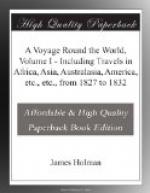At noon, we parted from the Neptune, and stood to the westward, for the river St. Nicholas, having had information that two Spanish vessels, trading for slaves, were in that river. At six, we passed the entrance of the Sombrero river, and, at midnight, that of St. Bartholomew’s river.
Friday, February 1.—In the afternoon, the Eden’s pinnace went to examine a small river, which was found to be the Sta. Barbara, but there were no vessels there, and about sunset, we anchored off the river St. Nicholas.
Saturday, 2.—At daylight, the Eden’s pinnace, the schooner’s boat, and a canoe, manned with Kroomen, all well armed, left the schooner to go in search of the two vessels said to be in the river; but they returned on board, having examined a large river, three creeks, and one town, without success. All they saw on the banks of the river, was a large dog, and a rattle, like those at Fernando Po.
Sunday, 3.—At daylight, weighed and stood to the westward. About nine o’clock we anchored off a long line of breakers, but no land in sight, in consequence of the haziness of the weather. That peculiar state of the atmosphere, which we call hazy, is, perhaps, more characteristically designated “the smokes,” on these coasts. Lieutenant Badgeley and Capt. Smith, went in the schooner’s boat to sound, and trace the passage into the river St. John, at the entrance of which we supposed ourselves to be situated. In the afternoon, the party returned, having not only found the entrance of the river St. John, but also one of the vessels of which we were in search. At half-past four, the pinnace, schooner’s boat, and Kroo canoe, were despatched, well manned and armed, to bring the schooner out of the river. At eleven, Captain Smith returned on board, and informed us, that, at sunset, they boarded the Spanish schooner Victoria Felicita, armed with one long nine-pounder and twenty men, and that they took possession of her with scarcely a show of resistance. The Spaniards endeavoured to get the gun ready, but the boats came so suddenly upon them, by rounding a point close to their moorings, that they were completely taken by surprise, and boarded before they could carry their measures of defence into effect. There were but two slaves and a part of the crew on board, the rest of the slaves and the remainder of the crew, being at the Barakoom, or Slave-yard, to which place they are always consigned so soon as they are purchased, and left until the vessel is ready for sea, to escape from the responsibility which would fall upon the commander of the vessel, in case any slaves were discovered on board. There were many slave-dealers on the schooner’s deck when the boats came in sight, but they all jumped overboard, and swam to the shore.
Monday, 4.—At daylight, Captain Smith left us to assist in bringing the prize out of the river, but the day being calm, she was not removed. We burnt blue lights, at intervals, during the night, as signals to the prize, or any boat that might be sent from her.




